Spring 2020 Season Summary
- Jul 29, 2020
- 17 min read
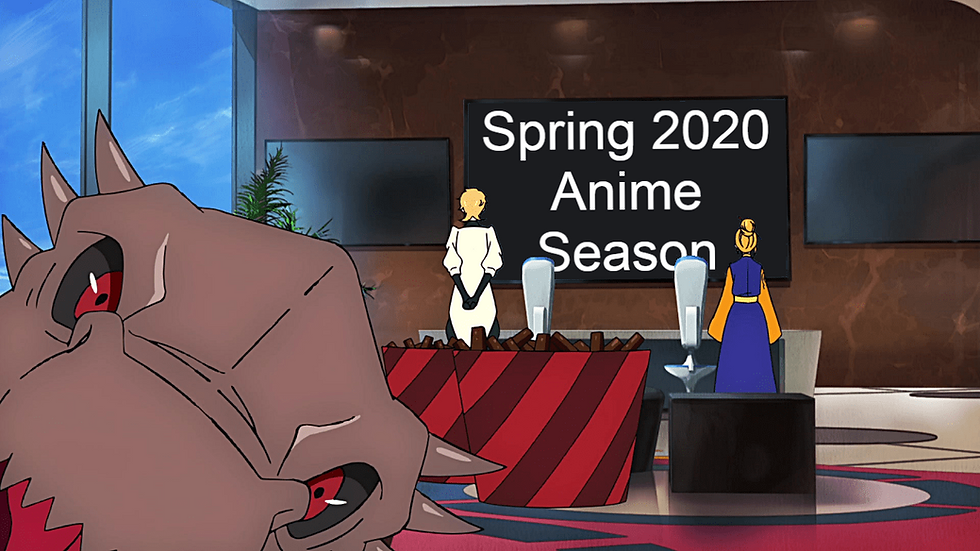
With my Adobe Photoshop license expired, I thought I'd try out some online alternatives. Not bad for a first attempt if I do say so myself.
Reminder: Any and all statements made in this post are solely representative of my current mindset. All thoughts, criticisms, and scores given are likely to change as I have more time to consider my thoughts, feelings, and context of the final product. In other words, this is little more than my raw personal opinion at the season's end. Why anyone would want that opinion is beyond me but, regardless of whether I get it or not, this is my summary of the Summer 2019 season of anime.
Opening Statement: Greetings fellow anime enthusiasts! The time has come for me to, once again, rise from my burnt-out grave so I might go over the past season's successes, failures, and generally mediocre offerings to the medium we all know and love. While several shows ended up getting cut down in their prime thanks to the ongoing Covid-19 outbreak, a surprisingly solid number of titles managed to make it through this historical rough spot. Nearly every genre I care to follow got some representation and there were quite a few shows that'll probably sit on my list of personal favorites for years to come. From nonsense moe titles to action-thrillers and rom-coms, pretty much everything that stuck around was worth watching and did their respective genres proud. In light of this, there won't be a "The Downright Terrible" section this season. Rather, I'll finish things off by listing off a few titles that either missed the mark for me, personally, and those that I outright avoided because I knew I wouldn't enjoy them. So, without further adieu, I think it's high time I kicked my critical brain back into gear.
The Good:
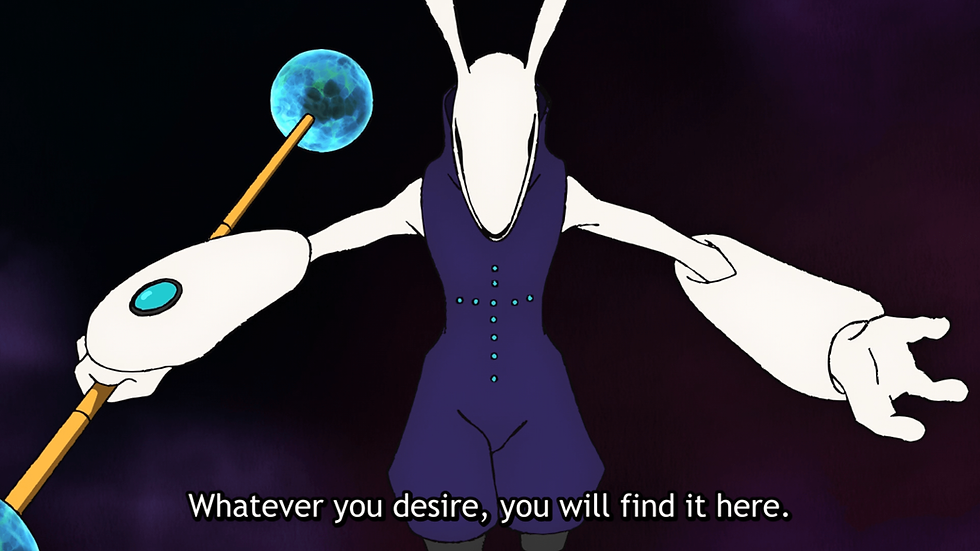
This. This is it! The time is now!
Way back when, during my Cheating Craft review, I predicted that there would eventually come a day when an unambiguously great Korean or Chinese series would make its way to the world of anime and open up a world of possibilities. That day is today. Thanks to a partnership between Crunchyroll and Webtoons, a free online provider of manhua, Tower of God has given the anime world a glimpse of what this relatively untapped media has to offer. More or less built on the bones of its spiritual predecessor, HunterxHunter, Tower of God takes a similar approach to the classic series as it strives, first and foremost, to get us invested in a cast of quirky killers who share a united goal to climb the titular Tower of God and have their wishes granted. The longer the story goes on, though, the less it focuses on its main character, the slow and kind Bam, and his goal to reunite with Rachel, a girl who abandoned him to go climb the Tower, and instead starts to zoom out. As character after character are introduced to us and we're given explanations for who they are and the dreams they hope to achieve by reaching the tower's peak, we steadily learn that this series hosts a massive world full of history and intrigue that we'll undoubtedly get to see as soon as we log into Webtoons and catch up with the anime. In other words, as strong as this series is, the adaptation feels more like a promotion for the source material and its host site than something that'll get a second season. Still, an anime fan can hope.

The moment I realized this show was being made by the Konosuba team.
Now, while it certainly didn't make any waves in the anime world the same way Tower of God did, Princess Connect! Re:Dive (Priconne) is a series that took me by surprise. While it might just be the latest in a long line of Cygames gatcha adaptations, I feel like this might be the best one I've seen yet. Full of gorgeous art, quirky characters, and the humorous sensibilities of Konosuba's director, Kanasaki Takaomi, it's no small wonder that this series was a resounding success--even more so than the Granblue Fantasy Animation. Above all those things, though, I'm still a little shocked to say that this series managed to get some real tears out of me whenever the series decided to slip in some drama and made it clear that the light, fluffy, Looney Tunes comedy wasn't going to last forever. Yet, as foreboding as that sounds, the hope that the main cast brings to this surprisingly deep world made it something I could look forward to if a second season ever gets announced.
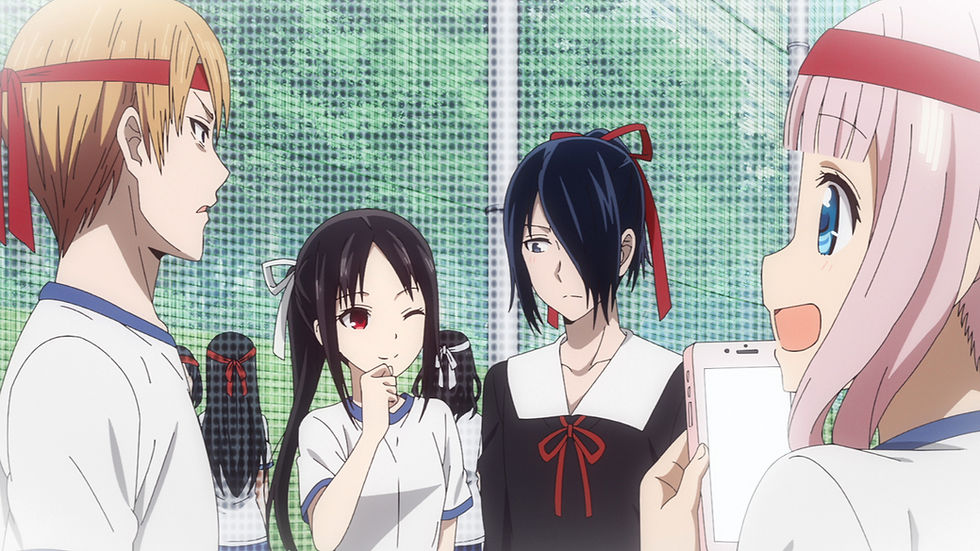
Speaking of getting the waterworks going, I'd like to talk a little bit about how good Kaguya-sama: Love is War? (Kaguya-sama Season 2) is. Rather than simply continuing the "Love is War" back-and-forth of the first season, this season focused mainly on showcasing how said "war" has steadily broken down both Shirogane and Kaguya's defenses and moved them significantly closer to the day when they inevitably confess their feelings. More than them, though, the season's greater focus on introducing a new cast of characters and developing the supporting cast made this season feel just as special as before. Before now, I honestly would have laughed off the idea that I'd end up loving Ishigami as much as Shirogane and Kaguya. Yet, against all odds, here I am giving solid consideration to whether or not Ishigami is best boy.

I can relate.
If we're going to be on the topic of best boys, though, I suppose I should also draw some attention to the season's "isekai otome game," My Next Life as a Villainess: All Routes Lead to Doom! (Hamefura). As awful and cringe as that might sound, Hamefura ended up being a guilty pleasure show for me purely because of its relatively wholesome and lighthearted approach to your typical otome drama. At the same time, though, it should be said that this more laid-back tone actively kills any stakes before the real drama of the series can get off the ground. Reborn as the antagonist of her favorite otome game when said character was still a child, the reborn Katarina immediately works to course-correct her fate and manages to unwittingly earn the love, rather than hate, of every single date-able character in the game, including the game's player character. Again, cringe as that might sound, the operative word there is "earn." Rather than simply adding people to her reverse harem purely because she exists, the selflessness and single-minded devotion to the people around her makes the cast's love for Katarina feel infinitely more legitimate and reasonable. The only real problems with the series are that it feels like it downplays the female love interests for humor's sake--not an uncommon problem in anime--and that its drama-free approach to drama made it prone to filler and a meandering focus that mildly hampered the impact of the show's ending. Considering that latter problem, though, I find myself much more concerned with what the show's second season is going to do with itself since it can't rely on the overused "Oh no, Katarina might get killed/exiled" joke anymore.

Who knows, you might even see me there.
As much as it pains me to say it, I felt a similar level of underwhelmed disappointment from Ascendance of a Bookworm 2 (Honzuki no Gekokujou 2). Make no mistake, the series is still fantastic and speaks to me on a level no other isekai has but maybe that's just my librarian bias showing. Yet, with the start of the second season, I could feel the series losing its focus as the plot takes Myne away from her passion for making books in this medieval fantasy world and forces her into a half-baked and fairly toothless political drama born of her, a commoner, joining the noble-exclusive ranks of the church. From gaining vassals whose problems Myne solves over the course of a single episode to mild threats against her family that never amount to anything, the first half of this new season felt like it dragged as it tried to establish that this world is larger and more magical than it initially let on. Once Myne finally starts to hit her stride as an authority in the church, though, the series regains some of its charm as Myne sets to work to do some real good for this world and its people. So, as troubled as this show's second season was at the start, it still stands as a show I'll love and remember for years to come.
The Tolerable:
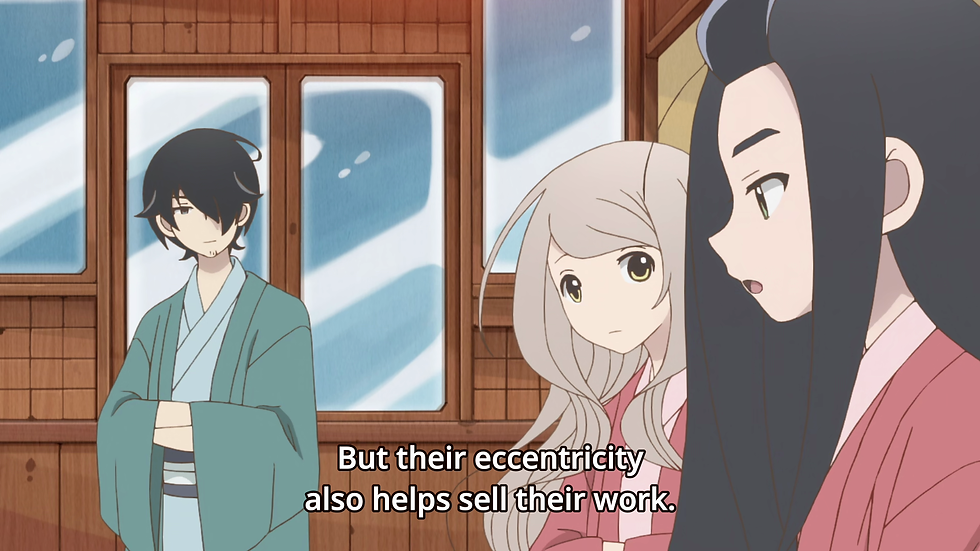
It's moments like this that make you wonder whether or not authors like Kumeta are just putting on an act.
Kakushigoto is, to put it mildly, something of an odd duck but that shouldn't come as a surprise to anyone familiar with the work of Kumeta Kouji, creator of Sayonara Zetsubo Sensei. Now, as much as I liked the show and what it had to offer both comedically and dramatically, I've put this series here because it is nothing short of a miracle that it works at all. Full of Japanese-exclusive comedic wordplay and absurdly dry wit, this is going to be a show that either works for you or doesn't. Very much a beast and story of two parts, the story is split into two parts. In one we have the day-to-day life of a single father and daughter as he tries to conceal the fact that he's a mangaka from her. This part is full of general absurdism as he tries to cover his ass whenever he nearly lets the secret slip and plenty of satirical ribbing of the manga industry. This is, more or less, the show's bread and butter. The second part, however, is a wholly dramatic prologue and epilogue to each episode featuring the young daughter, years into the future, learning the truth of who her father was--yes, was. Mainly concerned with the daughter, Hime, piecing together the puzzle that was her father's life, even greater mysteries start to unfold as her father's friends and coworkers start to appear and offer vague commentary that'll eventually lead us to learn what exactly happened to him. So, on the one side, you've got a dry, satirical comedy wholly invested in shooting barbs at a specific industry and, on the other, you've got a melancholic mystery that seems to promise that things aren't going to get better even if Hime finds what little closure she can. Now, consider those two, incredibly disparate parts and tell me that it isn't a miracle that the show manages to tie the two together at all--let alone as well as does. Normally, that fact alone would land this show in the "good" category but, again, the nature of its comedy only means it can sway between being "pretty good" and "absolute trash," landing it at a solid middle in "tolerable."
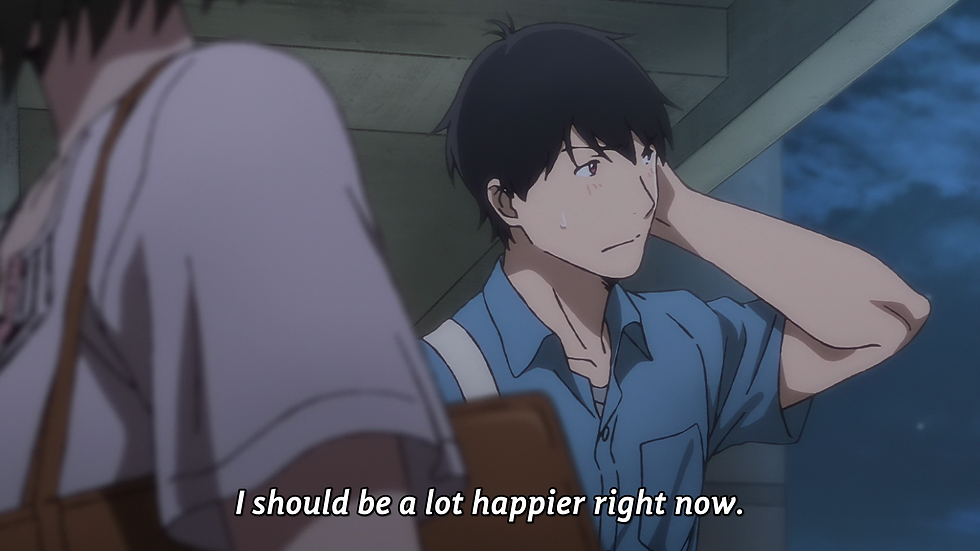
#2real: The Animation. Yeah, that more or less sums this series up.
Another hit-or-miss show from this season I liked overall was a little down-to-earth romantic drama series called Sing "Yesterday" for Me (Yesterday wo Utatte). Despite having zero affiliation to the classic Beatles song, the show's content does follow the general mood and theme of the work. In it, four characters of varying ages struggle to come to terms with their past loves and current lives, particularly when the four of them start dancing around each other because, of course, this wouldn't be a drama if there wasn't a romantic quadrangle. Though I find that kind of overwrought romantic drama to be grating, the series manages to handle these characters and their romantic journeys with a lot more maturity and grace than I've come to expect from the genre. Perhaps it's just because the cast is made up of a bunch of confused, thirsty adults--as opposed to hormonal teens--but the way the four characters struggle to move past their various hang-ups and eventually acknowledge that their romantic obsessions have been driving their emotional and professional development into the ground speaks to me on a level no other romantic drama ever has. Still with how low-key and down-to-earth this series is, it's a hit-or-miss title that'll either speak to you, like it did me, or bore you to tears.

Now, while Yesterday might be a hit-or-miss for its more down-to-earth approach to drama, Wave, Listen to Me! (Nami yo Kiitekure) is going to be a hit-or-miss series for the exact opposite reason. Going for the Hinamatsuri approach to absurdist comedy, Wave follows the misadventures of one Koda Minare as she gets unwittingly roped into the world of live radio broadcasting. What makes show hit-or-miss, however, isn't the show's focus on an obscure industry so much as the personality of its main character. Put bluntly, Minare is an absolute mess of a human being whose explosive and often volatile personality will probably make or break the show the same way Kakushigoto's comedy is only going to speak to a very specific audience. Thoughtless, shameless, violent moron that she is, Minare's problematic tendency to run her mouth and say every little thing that comes to mind is simultaneously the show's greatest charm and its greatest flaw because, for better and worse, she is the show. Every crass comment and explosive reaction she has drives the story forward as she steadily gets used to her new job as a radio host and, more often than not, gets herself in trouble when she misreads a situation and ruins the day or life of everyone around her. Yet, problematic as she might be, the VA's performance of the fast-talking troublemaker makes it clear that she's a perfect fit for the radio business and an absolute joy to just listen to once she gets going. Love her or hate her, she's the perfect character to introduce an audience to the world of audio-only radio. But, again, whether or not that fact even crosses your mind will depend wholly on whether or not you can put up with this grenade of a character with a machine gun for a mouth.

Serving as a polar opposite to Koda Minare's mutually destructive personality, the titular character of Arte manages to use her outspoken personality to prove an all-too-important point, both to herself and everyone she meets, that women are just as capable as men. Of course, with this series being set in 16th Century Florence during the height of the Renaissance, Arte has plenty of opportunities to drill that point home and prove her worth as an artist. In fact, some might say she has too many opportunities to do so. In much the same fashion that anime protagonists tend to just magically solve the problems of everyone around them, Arte only ever needs one chance to win over anyone who doubts her artistic talents and determination to be Florence's first female painter. While undeniably important, enjoyable, and a breath of fresh air from the world of anime, the ease with which Arte addresses and any all sexism, discrimination, and interpersonal problems kills a lot of the impact those kinds of moments deserve. Then, as if to make that problem even more pronounced, once Arte has proven her point all of her troubles more or less fall away before they can even reach her as more and more people find themselves willing to accept her or outright go to bat for her. Toward the series end, this problem becomes so obvious that she needs to be forcibly taken out of her comfort zone and placed in a new city that hasn't yet been graced by her infectious feminist aura. To the show's credit, though, this new situation does give Arte the ability to teach the lessons she's learned throughout the series to a young girl with a similar fiery determination to follow her dreams despite her social status, giving new meaning to everything she's done thus far. Still, as fantastic as the show's core lesson and its characters might be, there is the added problem that the show doesn't seem to know what tone it wants to go with. Swaying between being a period piece that offers insight into life in 16th Century Florence to a feminist drama to a romance that actively infringes on the show's core point on some level, nearly every facet of what makes this show good gets undermined by one of the others. So, yet again, as must as I like this show, the fact that it actively sabotages itself every step of the way makes it hard to be anything other than tolerable.
The Ongoing:
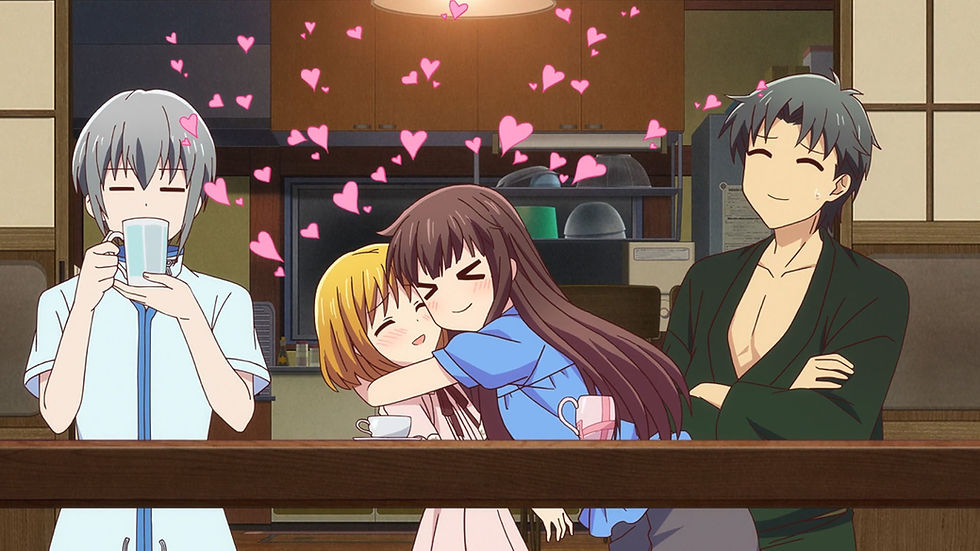
It's honestly been fascinating catching glimpses of how the show's older material gets upgraded and reimagined here.
Alright, truth be told, I haven't even touched Fruits Basket (2019) yet despite knowing that this new adaptation of the classic romance manga is several hundred times better than the older one--if for no other reason than the fact that it follows the manga. Still, despite not seeing it, I feel like it should go without saying that this show is a must-watch for anyone who isn't already familiar with the series despite how dated it might be at this point. Let it be known, though, that once this series is done, I have every intention of gorging myself on it this classic shoujo manga goodness once more. After all, what's not to like about a teen romance centered around a young girl working to break a curse that turns people into the animals of the Chinese Zodiac whenever they come into physical contact with a member of the opposite sex?
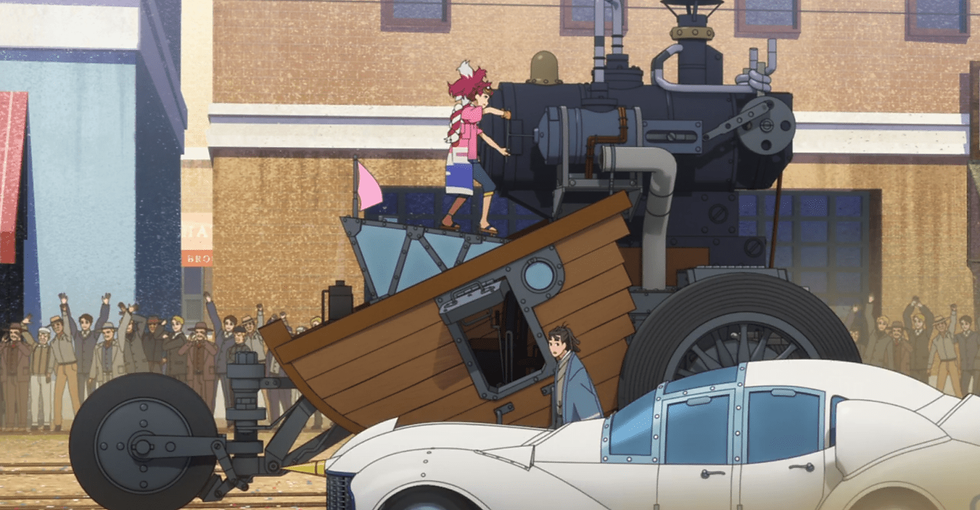
Yup...that's a car alright.
One of the casualties of the Covid-19 outbreak, Appare-Ranman! is supposedly set to continue airing during the Summer 2020 season but hasn't resurfaced just yet. From what little I saw of it, though, it looks like this show is going to a wild ride full of action, high-octane car racing, and some relatively harmless racism you'd expect from the series considering what classic cartoon it seems to be cribbing. Blending the general concept of Hanna-Barbera's Wacky Races with a heaping helping of anime tropes, the series follows the misadventures of the sociopathic genius, Sorano Appare, and his honor-bound samurai straight man, Isshiki Kosame, as they race across America in a steamboat-turned-automobile to prove themselves and maybe earn enough money to charter a ship back to Japan.

Took me a bit to come around to it but I'm starting to love this remakes' focus on worldbuilding.
Digimon Adventure (2020). What else is there to say, really? This series is a remake of the original stories of the Digidestined and one that has, so far, proved to be just as entertaining as the original despite not being 100% true to the source material. Starting the series off with a re-imagining of the second Digimon movie, "Our War Game," we're immediately set with the understanding that this series is going to be much more dramatic and fleshed-out than the original Saturday Morning cartoon series. In the span of the first few episodes, we see Taichi (Tai for those who were raised on the English dub), Yamato (Matt), and Koshiro (Izzy) earn their digivices and save Tokyo from an incoming nuclear missile with their Digimon partners. While I found myself wary of this much more dramatic start to the series, it sets a solid tone for where things are going to go with the series from that point forward. For one, the connection shared between Tai and Matt and their Digimon to create Omnimon sets a solid goal for where this series can expect to end--i.e. when they grow strong enough to achieve that state naturally and intentionally. Another thing to account for, though, is that starting the series with only these three characters indicates that the rest of the cast is going to be introduced much more slowly and steadily, making it much easier for each character to show off their personalities and what each of them bring to the team, as opposed to the original series that threw them all at you at once. Pairing that with the series' all-new scenes and conflicts that better establish the history of the Digital World and it becomes fairly clear within the first four episodes or so that this series is going to be something special.
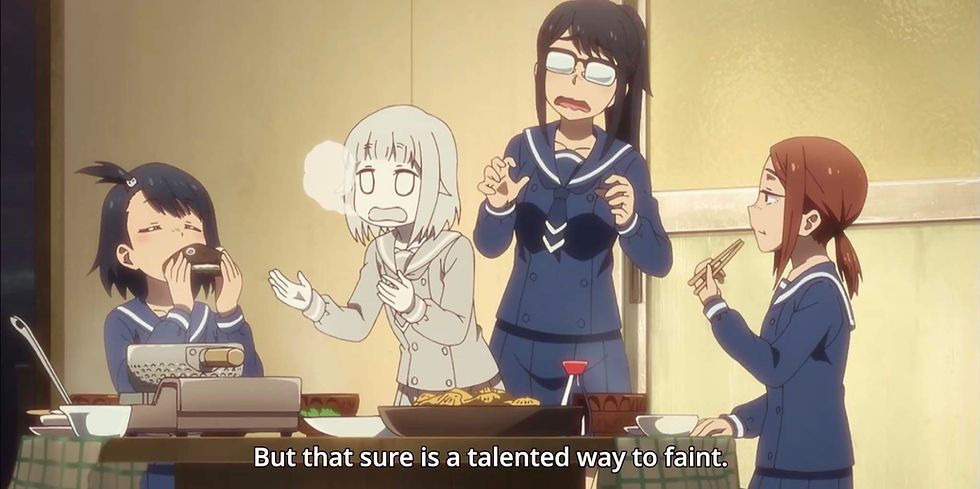
Another one of the shows that suffered being put on hiatus thanks to Covid-19, Diary of Our Days at the Breakwater (Houkago Teibou Nisshi) was set to be my obligatory moe show for the season but fate had other plans. To be honest, though, that might have been for the best. As much as I enjoyed the series cast and the fishing theme, I could feel the jokes getting old by episode two and seeing a character being sneakily strong-armed into joining a club she actively dislikes just doesn't speak to me. We'll see if I decide to pick this series back up once it starts airing again but the chances of that aren't looking too good.
The (dis)Honorable Mentions:
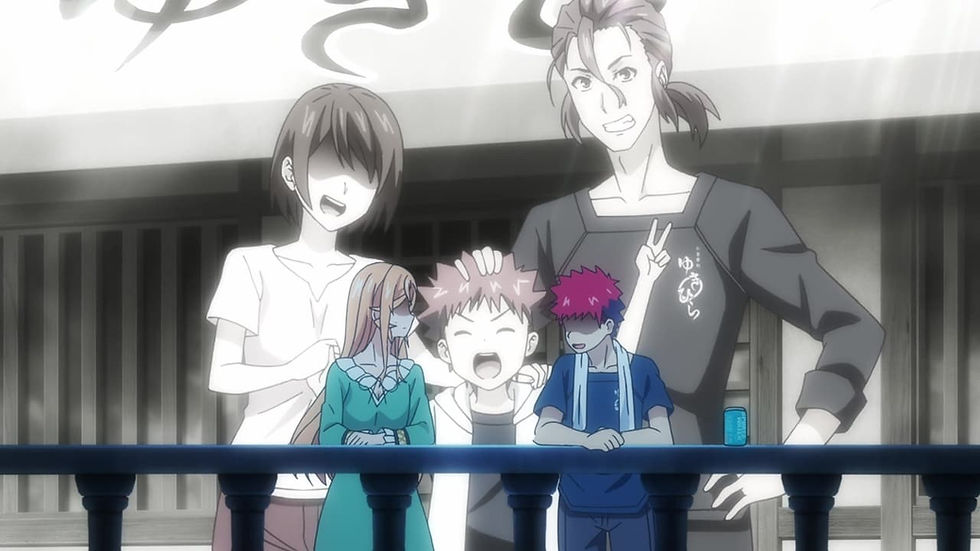
Huh...I think this is the first time we've seen or heard any mention of Soma's mom. Oh well, too bad I don't care anymore.
Like I said during my last Season Summary, I felt like Season 4 of Shokugeki no Soma was a perfectly fine place for it to stop. With Soma earning his place as the First Seat of Totsuki's student council and thus fulfilling the goal he stated at the show's start, I felt like nothing more needed to be said. From the romantic threads to certain unaddressed portions of Soma's past, I felt like everything could have simply been left up to the audience's imagination or addressed in some supplementary work. Yet, despite my satisfaction with the way things ended, we still ended up getting Food Wars! The Fifth Plate (Shokugeki no Soma: Gou no Sara), a sequel I didn't want and have heard only terrible things from the manga readers. From the sudden lack of detail in the cooking process to the series actively sabotaging Erina's stronger characterization by turning her into a damsel for Yukihira to romantically fight over and rescue from the season's new villain, absolutely nothing about what I saw this season interested me. I hope anyone still sticking with it has a good time but I'm opting to bow out while the getting's good.

...Could you be any more obvious?
Tragically, another show that instantly killed any interest I had in it within the first couple of episodes was the Eureka Seven-like, original mecha anime, LISTENERS. As interesting of its initial premise of music-powered mecha sounded, the series steadily revealed itself to be one of the laziest and uninspired original anime I've seen in a while. To call the series a paint-by-number recreation of your standard mecha series honestly wouldn't be much of an exaggeration. A young boy content to eke out a meager living in scrap-collecting town comes across the unconscious body of a young girl who is as enigmatic as she is amnesic and is dragged into the journey he secretly always wanted to go on once monsters attack his home town and the girl he finds turns out to be one of the few people who can turn music equipment into giant mechs. That's about as basic a premise as you can get for a mecha anime and while you might expect that the music theme might offer something interesting it ends up falling flat. From the idiotic music note monument that sits in the middle of a town that supposedly hates music to the mecha the girl summons just shooting lasers that have no tie-in to the musical theme, nothing about this series worked for me. For anyone new to the world of mecha, it might be a fine entry point but it pales in comparison to the series it stole most of its ideas from.
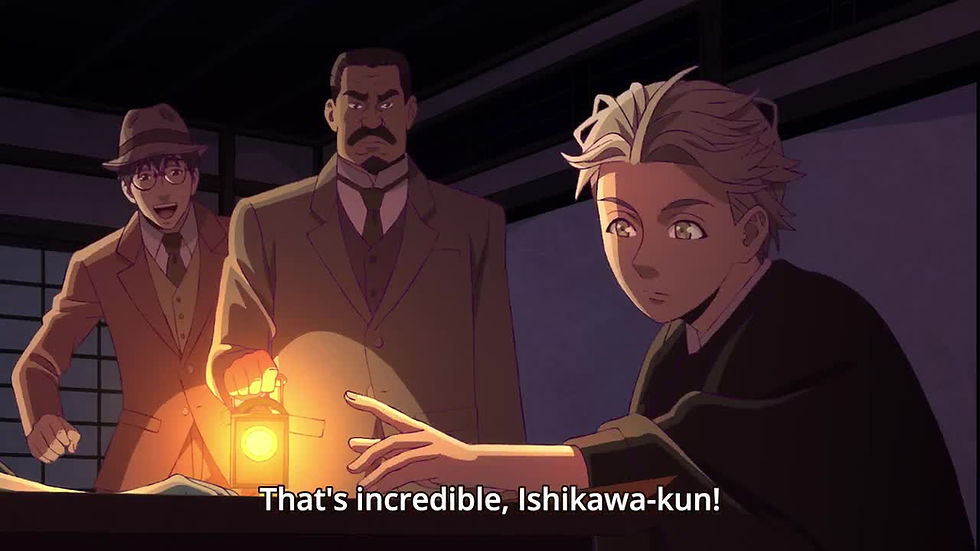
If Ishikawa is Sherlock and Kindaichi is Watson, does that make this other dude Lestrade?
While not nearly as egregious in its wrongdoings as the other two entries in this list of series I dropped, Woodpecker Detective’s Office (Kitsutsuki Tantei Dokoro) still failed to grab me conceptually. Starting with a flash-forward, we're introduced to the amicable and generally incompetent John Watson pf the series, Kindaichi Kyousuke, as he revisits his old tenement flat and mourns the death of his playfully abusive best friend, Ishikawa Takuboku, with whom he spent several years playing detective. Then, once this layered narrative is established, we jump into the episodic jumping from case to case which will typically always feature Kindaichi getting pushed around by and sacrificing everything for said abusive best friend and Ishikawa just making an utter ass of himself as he undermines the law at every opportunity. Tone-wise I can only describe the series as a Japanese attempt at Steven Moffat's Sherlock Holmes with some blatant otome game "husbando" overtones made all the more obvious by the open's obsession with dressing up and posing the cast in a variety of historical and modern outfits. With this series, I can certainly see that there is an actual audience for it but it became clear pretty quickly that I wasn't part of that audience.
Closing Statement: With the world being what it is right now, I still find it astonishing that we got so many shows we did this season, let alone such a solid line-up. Even the few shows that I ended up skipping or dropping had some merit that'd make them worth a watch. While LISTENERS' story and Shokugeki's general loss in quality killed them for me, I'm sure that other people will love them for what they are. So, love them or hate them, there were honestly plenty of shows to dig into while the outbreak has us all locked inside. The only real downside is that the dearth of shows I'd expected from this season will be hitting us during the Summer 2020 season. With only 10 new titles, 6 sequels, and a handful of leftovers, we're going to be starving for series to watch. Personally, I've only got 4 shows I've hard locked as things I'll be watching so I guess I'll be spending most of this season writing and catching up on all those Netflix series that aired earlier this year. In case you missed any of last season's fodder, though, I hope this rundown of the season might help you find a show you missed to pad out this drought of content. Best of luck out to all of you out there and stay safe.


Comments